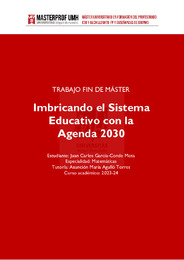Resumen :
Siempre que pensamos en el futuro nos vemos a nosotros mismos más viejos, pero en un entorno sociopolítico y económico similar al actual.
Vemos el error al mirar hacia atrás cuando observamos un entorno totalmente diferente.
Por otra parte, la ciencia ficción nos proyecta un futuro apocalíptico.
La realidad sobre el futuro nadie la sabe, y este trabajo evidentemente no pretende augurar.
Lo que sí está claro son los problemas que tenemos en la actualidad, problemas técnica y económicamente solucionables, otra cosa son los intereses geopolíticos y económicos de los primeros países del mundo.
El 25 de septiembre del 2015, la Asamblea General de las Naciones Unidas aprobó la Agenda 2030, esta agenda propone 17 Objetivos para el Desarrollo Sostenible (ODS) desglosados en 169 Metas. Estos ODS son una declaración de intenciones para mejorar el mundo en el que vivimos, y preparar un futuro mejor para la humanidad.
Para conseguir el cumplimiento es necesario el conocimiento de los mismos, es una cosa tan trivial, que tras leerla puede parecer redundante, pero ¿cómo se lleva a cabo?
Los ODS deberían ser parte de nuestra educación, no de una etapa concreta, sino de todas.
El trabajo pretende dar una visión bastante completa de la situación real actual, como de imbricados están el sistema educativo español con los ODS de la Agenda 2030, partiendo de la legislación y los derechos de las personas, pasando por el currículo y terminando con la motivación y preparación del profesorado y la respuesta del alumnado, acabando con una propuesta de situación de aprendizaje para el curso de 2º de la ESO.
Whenever we think about the future, we see ourselves as older, but in a socio-political and economic environment similar to the current one. We see the error when looking back and observing a completely different environment. On the other hand, science fiction projects an apocalyptic future. No one knows the reality of the future, and this work evidently does not intend to predict it.
What is clear are the problems we currently have, problems that are technically and economically solvable; another matter is the geopolitical and economic interests of the world's leading countries. On 25 September 2015, the United Nations General Assembly approved the 2030 Agenda, which proposes 17 Sustainable Development Goals (SDGs) broken down into 169 targets. These SDGs are a declaration of intent to improve the world we live in and prepare a better future for humanity.
To achieve compliance, it is necessary to be aware of them. This is such a trivial matter that after reading it, it may seem redundant, but how is it implemented? The SDGs should be part of our education, not just a specific stage, but all stages.
The work aims to provide a fairly comprehensive view of the current real situation, as well as how intertwined the Spanish educational system is with the SDGs of the 2030 Agenda, starting from legislation and people's rights, going through the curriculum, and ending with the motivation and preparation of teachers and the response of students, concluding with a proposal for a learning situation for the 2nd year of secondary education (ESO).
|
 La licencia se describe como: Atribución-NonComercial-NoDerivada 4.0 Internacional.
La licencia se describe como: Atribución-NonComercial-NoDerivada 4.0 Internacional.
.png)
